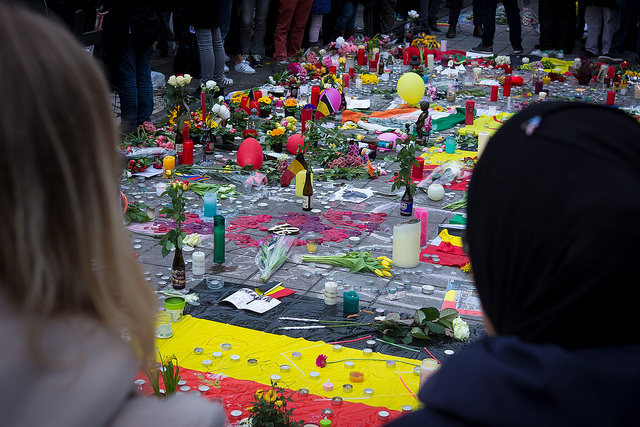Like this article? rabble is reader-supported journalism. Chip in to keep stories like these coming.
After the horrible news of the attacks in Brussels and the terrible loss of life, comes the interminable list of Muslim groups denouncing terrorism, followed by the interminable list of groups and pseudo-experts putting Muslims on the defensive, blaming them for the evil of all evils.
This cycle of violence and bigotry has been going on since the attacks of September 2001. The difference today is that it is getting uglier and more acute, attack after attack. The discussion fuelled by politicians and groups with political agendas revisits Edward Said’s theory of Orientalism, which describes the centuries-long portrayal of Islam and its adherents as inherently violent and apart from civilization — unless they either renounce their faith and their culture, or become civilized through colonialism and invasion. In a post-colonialist era, policies of exclusion and anti-immigration are also a continuation of this dangerous rhetoric.
Today, any discussion that tackles the issue of terrorism in a vacuum would be useless. Any discussion of the 9/11 attacks, London attacks, Paris attack and now the Brussels attacks, to name only these, would be incomplete without examining questions of colonialism, military intervention in the Middle East, the Israel-Palestine conflict, and Western countries’ support of dictatorships in the Muslim world.
The intent here is not to justify terrorism. It is to try to understand a complex situation without the bias of the “civilized” versus the “barbaric” — without the easy but so efficient cliché of “the terrorists are attacking our values of freedom and democracy.” At the same time, the challenge in this exercise is not to provide the attackers or any of their followers with additional reasons to continue down their violent path.
For a Muslim living in the West, the position is almost impossible: should I keep denouncing actions of individuals and groups over which I have no power, or should I criticize the actions of Western countries which drop bombs and kill innocent civilians with drones in Muslim countries? Every time you want to identify as a Muslim Canadian, someone reminds you to choose between the two.
Rather than coming from ISIS, the attacks on European soil can be better described as actions by a marginalized Arab population which never felt a sense of belonging or acceptance from the mainstream society into which they were born. Speaking the language or behaving like the other kids didn’t seem to make you European or French or Belgian enough. If ISIS didn’t exist, another violent ideology would have appealed to this young disenfranchised generation that refused to shut up and bow like their parents did. They found in ISIS and its affiliates actions that would make them visible, spoken about and infamously recognized.
It is ironic that after the Brussels attacks, a picture of the iconic Belgian cartoon character Tintin and his dog depicted as sad and crying was circulating in the media. I don’t know who was behind this idea, but probably someone unaware of all the accusations of racism against Tintin made when he visited Africa and other places around the world. Would everyone identify with Tintin’s sorrow? I am not sure of the answer.
Belgium has the highest per capita number of fighters joining ISIS. Much of its Muslim and immigrant population lives in ghettos. The unemployment rate in Brussels is the highest among European capitals: in 2014, the registered unemployment rate was 20.1 per cent, whereas it was 11.4 per cent for Belgium as a whole.
Of course, we don’t want to fall into idealistic thoughts about immigration and the challenges of integration, and we don’t want to imply that all immigrants are nice people; however, the facts speak for themselves and the exclusion of immigrants is a reality in many European countries and not just paranoia coming from immigrant communities.
Belgium and France both have heavy colonial pasts. These pasts didn’t go away when large Muslim populations immigrated and settled in those countries. In recent years, both governments banned Muslim scarves in schools and brought the notion of secularism into the public sphere. Patronizing and discriminating attitudes towards Muslims aren’t just ideas discussed in obscure Internet forums: they are laws affecting Muslim lives. ISIS has used the military participation of these countries in Syria as another recruiting tool of young Europeans who feel that their own government isn’t listening to them.
After the Charlie Hebdo attacks in Paris, many French citizens went out and denounced the attacks. I remember one French intellectual commenting: something that struck him in those waves of solidarity was that not many youth were there and not a lot of diversity was present.
An honest dialogue should happen in response to these attacks. More clichés and more propaganda will harden the feeling of both sides and will never erase centuries of violence and misunderstanding.
Monia Mazigh was born and raised in Tunisia and immigrated to Canada in 1991. Mazigh was catapulted onto the public stage in 2002 when her husband, Maher Arar, was deported to Syria where he was tortured and held without charge for over a year. She campaigned tirelessly for his release. Mazigh holds a PhD in finance from McGill University. In 2008, she published a memoir, Hope and Despair, about her pursuit of justice, and recently, a novel about Muslim women, Mirrors and Mirages. You can follow her on Twitter @MoniaMazigh or on her blog www.moniamazigh.com
Photo: Valentina Calà/flickr
Like this article? rabble is reader-supported journalism. Chip in to keep stories like these coming.



